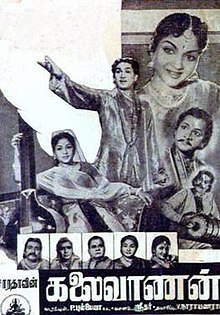
Akkineni Nageswara Rao, widely known as ANR, was an Indian actor and film producer, primarily known for his works in Telugu cinema. Over his seven decade career, he starred in numerous landmark films, becoming one of the most prominent figures in the industry. Nageswara Rao received numerous accolades, including seven state Nandi Awards, five Filmfare Awards South and a Tamil Nadu State Film Award. He was honoured with the Dadasaheb Phalke Award, the highest recognition in Indian cinema, in 1990. Additionally, he was awarded the Padma Vibhushan (2011), Padma Bhushan (1988) and Padma Shri (1968), by the Government of India for his contributions to art and cinema.
Vishwanath is an Indian surname and given name. It is of Hindu origin and derives from višvanatha, meaning "lord of the universe", including the Tamil-Malayalam third-person masculine singular suffix -n, -m. It may refer to:

Daana Veera Soora Karna is a 1977 Indian Telugu-language Hindu mythological film co-written, produced and directed by N. T. Rama Rao under his banner, Ramakrishna Cine Studios. Based on the life of Karna from the Mahabharata, it stars Rama Rao in three roles: the title character, Duryodhana, and Krishna. It also stars Rao's sons Nandamuri Harikrishna and Nandamuri Balakrishna, who play the roles of Arjuna and Abhimanyu, respectively. Music for the film was composed by Pendyala Nageswara Rao.
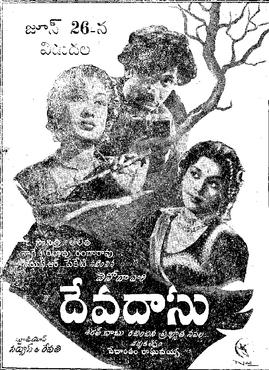
Devadasu is a 1953 Indian romantic drama film directed by Vedantam Raghavayya and produced by D. L. Narayana for Vinodha Pictures. Chakrapani wrote the script based on Sarat Chandra Chattopadhyay's novel, Devdas. C. R. Subbaraman composed the film's music. The film was edited by P. V. Narayanan, while B. S. Ranga provided the cinematography.

Annapurna Studios is an Indian film studio facility founded in 1976 by the Telugu actor Akkineni Nageswara Rao. It is located on a 22-acre (8.9 ha) site in Banjara Hills, Hyderabad. The studio provides comprehensive production and post-production services.

Mahamantri Timmarusu is a 1962 Indian Telugu-language historical drama film directed by Kamalakara Kameswara Rao. It stars N. T. Rama Rao, Devika, Gummadi with music composed by Pendyala Nageswara Rao. The film was produced by N. Ramabrahmam, A. Pundarikakshayya under the Gowtami Productions banner. The film won the President's silver medal for Best Feature Film in Telugu at the 10th National Film Awards.

Pendyala Nageswara Rao, known mononymously by his surname Pendyala, was an Indian composer, multi-instrumentalist, conductor, music producer known for his works predominantly in Telugu cinema along with Tamil and Kannada films.

Velugu Needalu is a 1961 Telugu-language film produced by D. Madhusudhana Rao under the Annapurna Pictures banner and directed by Adurthi Subba Rao. It stars Akkineni Nageswara Rao and Savitri, with music composed by Pendyala Nageswara Rao.

Donga Ramudu is a 1955 Indian Telugu-language drama film co-written and directed by K. V. Reddy. It stars Akkineni Nageswara Rao, Savitri, Jamuna, and Jaggayya with music composed by Pendyala. The film was produced by D. Madhusudhana Rao under the Annapurna Pictures banner.

Thodi Kodallu (transl. Sisters-in-law) is a 1957 Indian Telugu-language drama film directed and edited by Adurthi Subba Rao who co-wrote the script with D. Madhusudhana Rao and Acharya Aatreya. Madhusudhana Rao produced the film under Annapurna Pictures. It stars Akkineni Nageswara Rao and Savitri, with music composed by Master Venu. The film is based on Sarat Chandra Chattopadhyay's Bengali novel Nishkriti, and was simultaneously made as the Tamil film Engal Veettu Mahalakshmi (1957); both films were made simultaneously by the same banner and director, and some of the scenes and artists are the same in both versions. Thodi Kodallu won the Certificate of merit for Best Feature Film in Telugu.

Jayabheri is a 1959 Indian Telugu-language biographical film directed by P. Pullayya who co-wrote the script with Acharya Aatreya. The film is based on the life of poet Kaasinath and stars Akkineni Nageswara Rao and Anjali Devi. The film was produced by Vasireddy Narayana Rao with music composed by Pendyala Nageswara Rao.
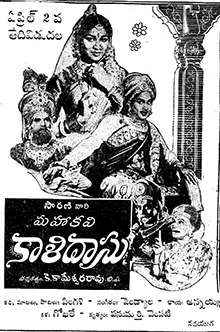
Mahakavi Kalidasu is a 1960 Indian Telugu-language biographical film directed by Kamalakara Kameswara Rao and written by Pingali. It stars Akkineni Nageswara Rao and Sriranjani Jr., with music composed by Pendyala. It was produced by K. Nagamani and P. Suri Babu. The film is based on the life of the poet Kalidasa.

Keelu Gurram is a 1949 Indian Telugu-language swashbuckler film produced and directed by Raja Saheb of Mirzapuram under the Sobhanachala Pictures banner. It stars Akkineni Nageswara Rao and Anjali Devi, with music composed by Ghantasala. The film marks the debut of Ghantasala as a composer who would later become a noted composer and playback singer.

Kanna Talli is a 1953 Indian Telugu-language drama film, produced and directed by K. S. Prakash Rao under the Prakash Studios banner. It stars Akkineni Nageswara Rao and G. Varalakshmi, with music composed by Pendyala Nageshwara Rao. The film is the debut of Telugu popular singer P. Suseela and actress Rajasulochana into the film industry. The film was simultaneously shot in Tamil as Petra Thai, for which the dialogues were penned by S. A. Subbaraman.

Sri Krishnarjuna Yuddhamu is a 1963 Indian Telugu-language Hindu mythological film, produced and directed by K. V. Reddy under the Jayanthi Pictures banner. It stars N. T. Rama Rao, Akkineni Nageswara Rao and B. Saroja Devi, with music composed by Pendyala Nageswara Rao. The film was based on the Telugu play Gayopakhyanam written by Chilakamarti Lakshmi Narasimham in 1890. It was later dubbed into Kannada and into Tamil.

Pellinaati Pramanalu is a 1958 Indian Telugu-language comedy drama film, produced and directed by K. V. Reddy. It stars Akkineni Nageswara Rao and Jamuna, with music composed by Ghantasala. The film was simultaneously made in Tamil as Vaazhkai Oppandham with a slightly different cast that released the following year.
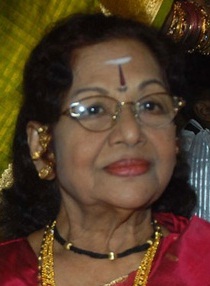
Chittajallu Rajeevalochana, better known as Rajasulochana, was an Indian classical dancer and actress. She has acted in more than 300 Telugu, Tamil, Kannada, Malayalam and Hindi language films.
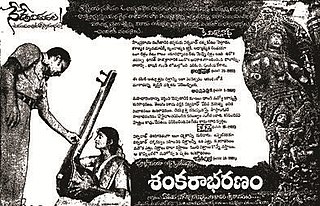
Sankarabharanam is a 1980 Indian Telugu-language musical drama film written and directed by K. Viswanath. Produced by Edida Nageswara Rao under Poornodaya Movie Creations, the film stars J. V. Somayajulu, Manju Bhargavi, Chandra Mohan, and Rajyalakshmi. The soundtrack was composed by K. V. Mahadevan. The film explores the cultural divide between Indian classical and Western pop music through the perspectives of characters from different generations.

Charana Daasi (transl. Wife) is a 1956 Indian Telugu-language drama film written by Vempati Sadasivabrahmam and directed by T. Prakash Rao. It stars N. T. Rama Rao, Akkineni Nageswara Rao, Anjali Devi and Savitri, with music composed by S. Rajeswara Rao. The film is based on Rabindranath Tagore's 1906 Bengali novel Noukadubi. It was simultaneously made in Tamil as Mathar Kula Manikkam (1956)
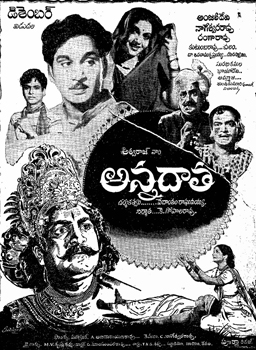
Annadata (transl. Farmer) is a 1954 Telugu-language drama film, produced by K. Gopala Rao under the Ashwaraj Films banner and directed by Vedantam Raghavayya. It stars Akkineni Nageswara Rao and Anjali Devi, with music composed by P. Adinarayana Rao.
